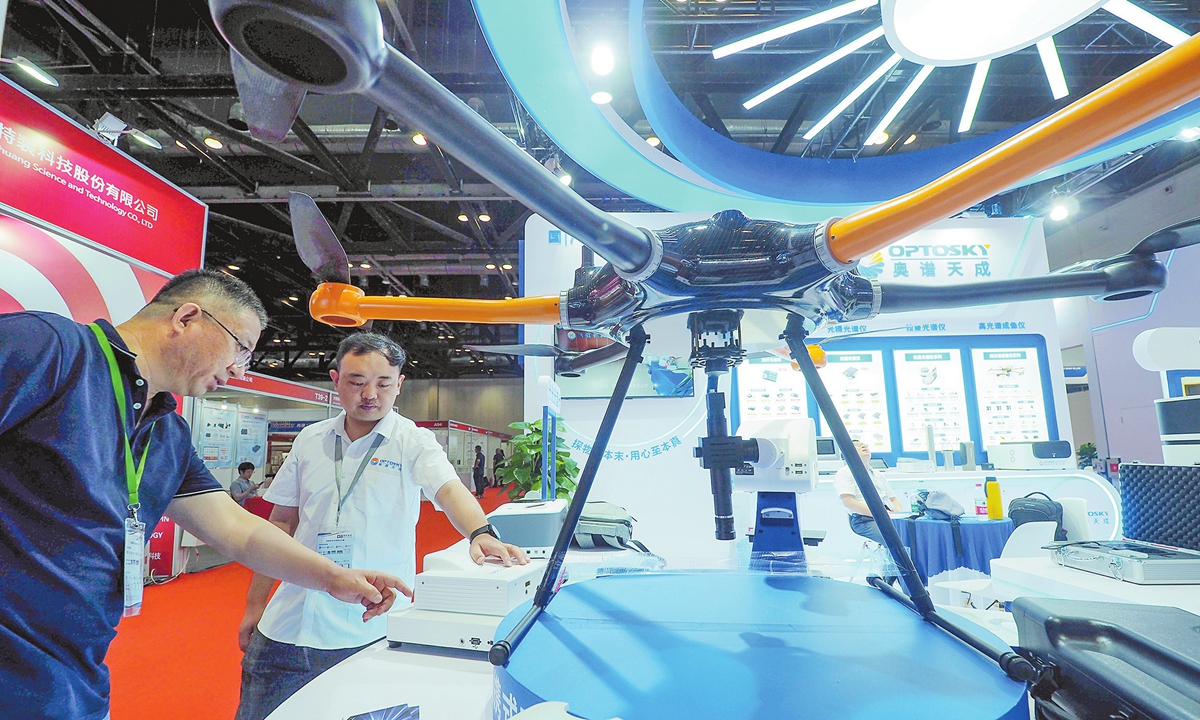
Two visitors look at a hyperspectral imager on an unmanned aircraft at the World Photonics Congress 2024 in Beijing on July 25, 2024. The four-day conference focuses on the innovation and development of photonics technologies, including lasers, infrared equipment as well as measurement and control technologies. Photo: VCG
China has implemented a special guarantee plan to support scientific and technological (sci-tech) innovation, under which a national fund will increase its risk-sharing and compensation for small tech firms to support their innovation endeavors, an official with the Ministry of Finance (MOF) said on Tuesday.
The move is part of a broader effort by China to achieve sci-tech self-reliance, as the US and some other Western countries have been stepping up a crackdown campaign to stop China's technological rise.
The plan aims to further leverage the role of the National Financing Guarantee Fund, increase risk-sharing and compensation for small and medium-sized enterprises (SMEs) in sci-tech innovation, and offer strong support for achieving high-level sci-tech self-reliance, accelerating the formation of new quality productive forces, and promoting high-quality economic development, an MOF official said in a post online.
It comes after the MOF, along with several other Chinese government departments, released a notice on July 24 regarding the establishment of a special guarantee plan to support sci-tech innovation.
Among the key points of the plan, the risk-sharing ration of the National Financing Guarantee Fund has been increased from 20 percent to a maximum of 40 percent. Meanwhile, the risk-sharing ratio of provincial-level financing guarantee institutions has been set at no less than 20 percent, according to the notice.
Also, the upper limit of the amount of financing can be guaranteed for a single SME for sci-tech innovation has been increased from 10 million yuan ($1.4 million) to 30 million yuan, the notice said.
China previously established the National Financing Guarantee Fund in 2018 to tackle financing challenges faced by SMEs and businesses related to agriculture.
Since then, the fund's re-guarantee business has accumulated a total scale of 4.73 trillion yuan, serving approximately 4.2 million operating entities and more than 40 million employees. "It has played a positive role in meeting the financing needs of inclusive fields, assisting the development and growth of small and micro enterprises, and promoting the continued recovery of the national economy," the MOF official said on Tuesday.
In addition, in order to implement the special guarantee plan for sci-tech innovation and achieve concrete results, "we will strengthen the coordination of fiscal, monetary, and scientific and technological policies to form policy synergy," the official said.
The move comes as China has been stepping up efforts to bolster sci-tech innovation, as the US and some of its allies have waged a tech crackdown against China. Achieving sci-tech self-reliance has become a top priority, according to China's recent top policy meetings.
A meeting of the Political Bureau of the Communist Party of China (CPC) Central Committee on July 30, which focused on the economic work for the second half of 2024, stressed the need to achieve greater self-reliance and strength in science and technology and to strive for breakthroughs in core technologies in key fields.
The communique released following the third plenary session of the 20th Central Committee of the CPC also listed education, science and technology among various factors that will help boost the overall performance of China's innovation system.
Global Times




